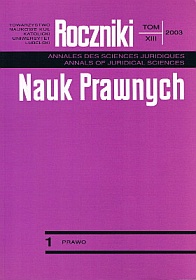Konstytucja cesarstwa Japonii z 1889 roku
Abstrakt
The considerations in the present text are concerned with the Constitution of the Japanese Empire of 1889. The Constitution was granted by the Emperor and in a sense it was the crowning touch of the radical changes in the state caused by the overthrow of the rule of the military aristocracy (shoguns) and the restauration of the emperor's position. The constitution was modelled after the solutions accepted in the constitution of the Kingdom of Prussia of 1851. Hence it was an act that was rather supposed to stabilize the position of the monarch and to leave the most important instruments for ruling the state in his hands. However, it has to be noticed that in the Japanese, or even more broadly speaking, Asian reality the provisions of that act were decidedly tantamount to entering the road to building modern mechanisms of the functioning of the state. From that moment the Emperor's power was not limited in any way, but it received constitutional foundations and in several aspects exercising it required cooperation of the Parliament, Government or judicature. For the first time the Constitution also guaranteed at least formal equality of the Japanese citizens and it also guaranteed them a catalogue of fundamental civil rights. Connected with gaining (albeit initially on a limited scale) active political rights by a certain group of citizens, these were unprecedented events in the history of Japan. Hence the act, although compared to other European or American provisions of that time it could hardly be considered a document of consequence, was undoubtedly one for its country.
Copyright (c) 2003 Roczniki Nauk Prawnych

Utwór dostępny jest na licencji Creative Commons Uznanie autorstwa – Użycie niekomercyjne – Bez utworów zależnych 4.0 Międzynarodowe.


